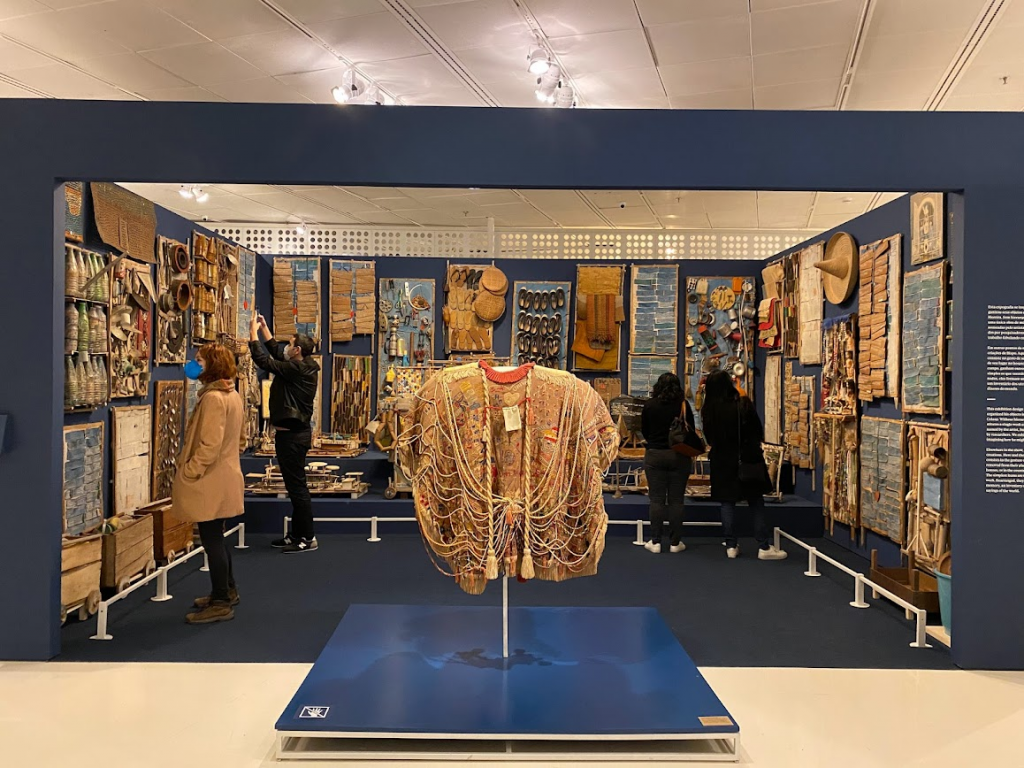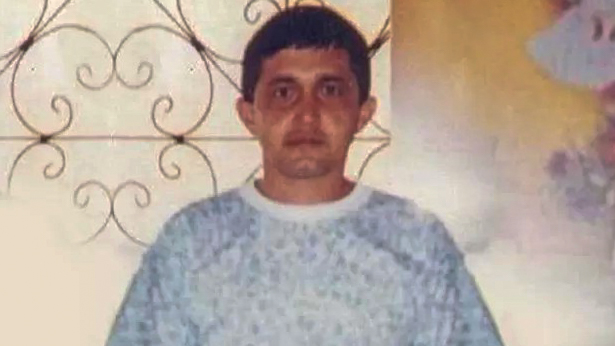
King, madman and saint
Although the man in the photo above inspires us with the sovereignty of a monarch, he also reveals predicaments that are targets of the prejudice that unfortunately still exists in Brazil: black, northerner and a mental health patient.
He is Arthur Bispo do Rosário, a Brazilian artist born in the State of Sergipe. He lived between 1909 and 1989, but when he turned 30, he had a psychological crisis in which, according to him, he received a divine mission to recreate the world in the form of art. This led him to spend the rest of his days in psychiatric institutions. During this time, he was diagnosed with schizophrenia and underwent treatments, including isolation and electroshock, which were common at the time.
Even with all these difficulties, Bispo do Rosário imprinted his particular universe through art. He became known around the world through his works, which include objects, embroideries and installations made from scraps of fabric, buttons, clothes and other discarded materials he found in the hospital where he lived.
Today he is recognized as a divinity by critics who consider him a landmark in contemporary Brazilian art and perpetuate him both for his life story and the impact of his creations.
Click here and know the Arthur Bispo do Rosário Museum!

Conduct or condition? The question involving real stories
Black, northerner and mental health patient. Fábio Sousa Santos, 39, was also diagnosed with schizophrenia. He lives in Formoso do Araguaia, a municipality of 18,000 inhabitants, located in the southwest of the State of Tocantins, approximately 270 km from the capital Palmas.
The disease has always been a concern for his family, especially since his youth, when Fábio became acquainted with crack. The effects of the drug triggered numerous bouts of aggression, which resulted in legal proceedings and a two-year prison sentence.
Thanks to the efforts of the family and the implementation of the Anti-Asylum Policy of the Judiciary in the State of Tocantins, three months ago Fábio got out of jail, works and lives under the care of his mother and brother.
The Ximenes Lopes case
But to better understand the return of Fábio to family life, let's go back in time and learn about another character. In 1999, in the municipality of Sobral, in the interior of the State of Ceará, Damião Ximenes Lopes was found dead, with signs of aggression and torture at the Guararapes Retirement Home, a now-defunct private psychiatric care center, which at the time was contracted by the State to provide mental health services through the Unified Health System (SUS).
Due to alterations in the functioning of his brain, Damião was also diagnosed as suffering from mental illness and, at the age of 30, he was admitted to the “Retirement Home” in full physical condition and with no signs of violence. But after two days in the hospital, he had bouts of aggression and he was forcibly restrained by a nursing assistant and other patients.
The next morning, when she visited her son, Albertina Viana Lopes found Damião tied up, struggling to breathe, with visible bruises, bleeding and dirty with feces and urine. On the same day, he was medicated by the clinical director of the institution, but without specialized medical assistance, he couldn't resist and died.

Justice
The family of Ximenes Lopes sought justice and, faced with lawsuits and appeals, as well as delays in investigating and punishing those responsible, took the Brazilian state to the Inter-American Court of Human Rights in San José, Costa Rica. The result: the case led to thes first conviction of Brazil for human rights violations in 2006.
Click here and check out the full decision!
The ruling demanded a series of measures from the government aimed at guaranteeing the rights and quality of life of people with mental disorders. These include the creation of the Anti-Asylum Policy of the Judiciary, established by the Resolution 487/2023 of the National Council of Justice (CNJ). The regulations take into account, above all, the principle of human dignity, as set out in the item III of the article 1 of the Federal Constitution of 1988; and also the restructuring of mental health care models, provided for in the Law No. 10.216/2001, also known as the Psychiatric Reform Law.
Deinstitutionalization
The resolution of the CNJ also determines the review of cases involving mental health patients who have been diagnosed, are in conflict with the law, are in custody or are sentenced in the prison system. The aim is to de-institutionalize these people and progress of the criminal proceedings to outpatient treatment, including transfer to an appropriate health establishment.
In other words: mental health patients serving time in penitentiaries or judicial asylums return to social life and are integrated into the monitoring units of the Unified Health System (SUS), such as the Psychosocial Care Centers (Caps).
Judge Allan Martins Ferreira, head of the 4th Criminal and Penal Execution Court in the city of Palmas, recalls that the Brazilian Penal Code dates from 1940 and it is currently in disagreement with the Anti-Asylum Policy of the Judiciary.
“We still live in a situation where people with diagnosed mental disorders, who have been declared unimputable, are imprisoned improperly and serve time like a common prisoner, without any proper treatment. This reveals a certain degree of backwardness and a mismatch with the Psychiatric Reform Law itself, which advocates treatment in an open environment and on the territorial basis of the person,” said the magistrate.
Prejudice
Even though his state of health has led Fabio to commit crimes, Valdineis Sousa Santos has lost count of the episodes of prejudice suffered by his family because of the condition of his brother.
“I remember one time, I was with a colleague who had lost his cell phone. And that day Fábio had a crisis, he was walking down the street and approached us. The colleague blamed him. But my wife was also there and saw that Fábio hadn't picked up the phone,“ he says, pointing out that ‘even though Formoso (do Araguaia) is a small town, and our family is known as ’hard-working people', unfortunately we still go through this kind of situation,” he comments.
hand in hand
In order to lead the process of deinstitutionalizing mentally ill patients, the Anti-Asylum Policy recommends joint action between several public institutions, with the creation of an Inter-Institutional Working Group on Mental Health (GTI). In the State of Tocantins, it is made up of representatives from the Judiciary, the State Prosecution, the Public Defender's Office and the State and Municipal Executives, through the Health Departments.
Among its duties, the GTI is responsible for ensuring the performance of the Psychosocial Care Network (Raps), made up of SUS facilities which, in addition to the Psychosocial Care Centers (Caps) and other services, also have: Therapeutic Residences (SRT), responsible for welcoming patients who don't have family ties; Social and Cultural Centers; and the Back Home Program (PVC), which helps patients who return to their families.
The Group is also responsible for forming a Team for the Evaluation and Monitoring of Therapeutic Measures Applicable to People with Mental Disorders in Conflict with the Law (EAP), which offers multidisciplinary follow-up and monitors each case, before, during and after leaving the prison system.
overview in the state of Tocantins
In the State of Tocantins, Judge Allan Martins Ferreira is also the coordinator of the Inter-institutional Working Group on Mental Health. He reveals that the EAP of the State of Tocantins has two psychiatrists, two psychologists, two social workers, a nurse and a pharmacist. And according to the magistrate, in addition to Fábio, the team looks after 17 other mental health patients in the process of being de-institutionalized in the State.
“These 18 cases have been under study for a year now, with the EAP looking into the situation of each one. And of all the cases, we have assessed that six people no longer have family ties and they will be sent to a Therapeutic Home. This is an ordinary home, inserted into society under the care of trained professionals. There, all the necessary assistance is offered so that these patients can re-establish their social life,” he explains.
The State of Tocantins currently has two Therapeutic Residences, but only one available space. From then on, a partnership between the Judiciary of the State of Tocantins and Palmas City Hall, through the Municipal Health Department, will make it possible to set up another unit, as the magistrate explained.
“The Therapeutic Residence only receives funding from SUS and the Ministry of Health once it has been authorized. That's why we will initially draw up a cooperation agreement to make it possible for this new unit to operate, which will receive these six patients,” he said.
at home
The other 11 patients who have family ties return home, under the guardianship of a relative, as is the case with Fábio. According to Valdineis, “today Fábio is doing well”, pointing out that as well as working out, his brother goes to Caps once a week. “Every Wednesday he goes to Caps. He's seen by the doctor, and I also talk to him a lot. There, Fábio also signs a paper, a document that proves that he is in treatment.”
Whether they live in the Therapeutic Residence or with a family member, all deinstitutionalized patients have a Caps at their disposal in the municipality where they live. And, “every 30 days, the Eap will present a report to the criminal Judge responsible for each criminal case or security measure of the patient,” says Judge Allan Martins Ferreira.
raising awareness is also the role of the judiciary
Another competence of the Inter-institutional Working Group on Mental Health (GTI) is to raise awareness among civil society, through campaigns and the exchange of knowledge. The Judiciary of the State of Tocantins, for example, offers an initial training course for members of the justice system on the implementation of the anti-asylum policy in the State of Tocantins.
Click here and learn more!
“It's a meeting aimed at Judges, Prosecutors, Public Defenders, lawyers, social assistance and health professionals working at municipal and state level, and students. In the program we've tried to bring in specialists from all over the country, people with a lot of experience on the subject, on the Resolution 487 itself and Law 10.2016. In other words, it's an opportunity to standardize, level out knowledge and present society with what we've already done and what we can do,” adds magistrate Allan Martins Ferreira.
Since 2006, Brazil has been developing policies for the care and inclusion of mental health patients. And the good news is that, given the results, in 2023 the Inter-American Court of Rights concluded the sentence handed down to the country in the Ximenes Lopes case, as you can see below clicking here.
But that doesn't mean that the anti-asylum struggle is over. There is a lot of work ahead and the transformation of society begins with the transformation of the way citizens look at things. Valdineis believes that people like Fábio should be assisted for their health condition and not as criminals.
“God made us all equal, no one is more than anyone else. Here in Formoso, he's discriminated against because he has this problem, but he's a worker, he's always been a worker and he's never been abandoned by us (the family),” he concludes.
The application of the Anti-Asylum Policy of the Judiciary is a fundamental change to raise awareness and combat the prejudice experienced by Arthur Bispo do Rosário, Damião Ximenes Lopes, Fábio Sousa Santos and several other people with mental disorders. But it needs your contribution to promote a fairer and more supportive society!




